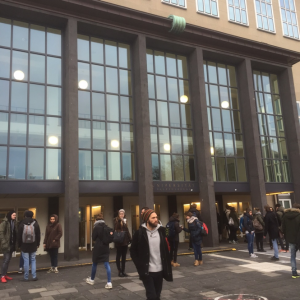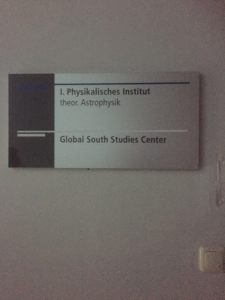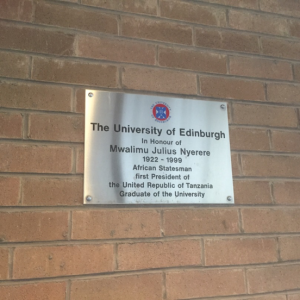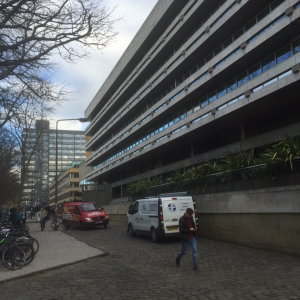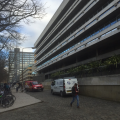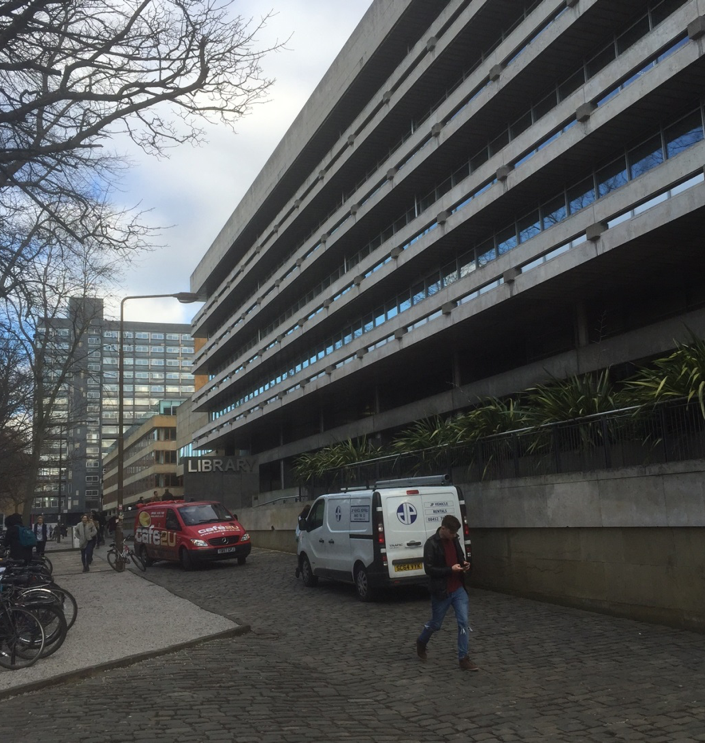
Germany and Scotland Report:
My visit to University of Cologne and University of Edinburgh
Kyoto University
Graduate School of Asian and African Area Studies
Associate Professor
TAKADA, Akira
During my trip to Europe from 13 – 28 February 2016, I visited the Universität zu Köln (University of Cologne), Germany and the University of Edinburgh, Scotland, United Kingdom. The purpose was to discuss the plans and administrative responsibilities concerning the project “Network Formation for Reconstructing the Paradigm of African Area Studies in a Globalizing World,” and gather information.
At the University of Cologne, I met Prof. Dr. Thomas Widlok, Sr. Researcher Dr. Clemens Greiner, and Assistant Prof. Dr. Michaela Pelican at the Global South Studies Center (GSSC) to discuss the “Network Formation for Reconstructing the Paradigm of African Area Studies in a Globalizing World” project. The University of Cologne (Photo 1) is one of the longest-established academic institutions among European universities and is part of the German Universities Excellence Initiative. GSSC (Photo 2) was established in 2014, and builds on the highly recognized achievements brought about by the research expertise of the University of Cologne in disciplines such as social and cultural anthropology, African studies, history, linguistics and media studies. Its purpose is to promote interdisciplinary area studies of the African and Asian regions under global conditions. It has distinguished itself as a research institute and is expected to continue to do so in leading research activities in these numerous fields.
The discussion that took place on this visit concerned the conditions and expectations for the activities of the young researchers who are to be sent to the University of Cologne (GSSC) from Kyoto University, as well as concrete conditions and research activities of GSSC scholars invited to Kyoto University. The members of GSSC organize seminars and symposia related to area studies and anthropology focusing on Africa. I believe that these events will provide young researchers sent from Kyoto University with opportunities for fruitful academic exchange. I also had opportunity to see the large volume of valuable materials collected by University of Cologne scholars pertaining to the languages, societies and cultures of Africa (some extending back 5000 years).
Photo1: University of Cologne, main campus.
Photo 2: The still very new Center doorplate of the GSSC, University of Cologne.
At the University of Edinburgh I visited the Centre of African Studies and met its director Dr. Barbara Bompani. We discussed the project “Network Formation for Reconstructing the Paradigm of African Area Studies in a Globalizing World” and I made concrete proposals and we shared suggestions on how to coordinate activities for the smooth operation of the project.
The University of Edinburgh is a world leading academic institution located in Scotland. Established in 1962, the Centre of African Studies boasts a distinguished legacy as one of the centers for African studies in Europe, and has been training and producing many highly acclaimed academics and professionals. It should be noted that Julius Kambarage Nyerere, the first president of Tanzania, in his early years had studied at the University of Edinburgh (Photo 3). Today, at this Centre there are over one hundred research staff and graduate students devoted to research focused on Africa. I was also able to visit the University of Edinburgh library that houses one of the largest and most valuable collections in the United Kingdom (Photo 4).
Photo 3: The commemorative plaque honoring Julius Kambarage Nyerere on the Chrystal Macmillan Building, where the Centre of African Studies and Social Anthropology department are located.
Photo 4: The Main Library, University of Edinburgh.
I also attended several events, namely, a weekly seminar held in the Centre of African Studies, where Dr. Jon Schubert, a recent graduate of the Centre, gave a talk on “Interrogating the ‘New African Middle Class’: urbanity and aspiration in post-war Luanda,” a weekly Social Anthropology seminar with Prof. Martin Holbraad visiting from the University College London speaking on “Three Ontological Turnings,” and another seminar co-organized by the Asian Studies and Politics and International Relations departments, where Dr. Ayako Kusunoki from the International Research Center for Japanese Studies gave a lecture titled “Japanese perspectives on Asian diplomacy.” The lectures and questions were of high quality and the discussions were conducted in a lively manner. Preceding the seminars a coffee hour (with a light meal and conversation with participants) was held near the venue, and afterwards a get-together for drinks at a nearby pub was held, allowing one to enjoy the atmosphere and culture of Edinburgh along with intellectual exchanges. Attending these events gave me a chance to get a firsthand understanding of the energetic research activities that are conducted at the university. I believe for the young researchers and scholars who are to be sent from Kyoto University, it would be important to attend these seminars, and if given the opportunity to give lectures themselves, because, with no doubt, this will prove to be a very fruitful experience for them.

